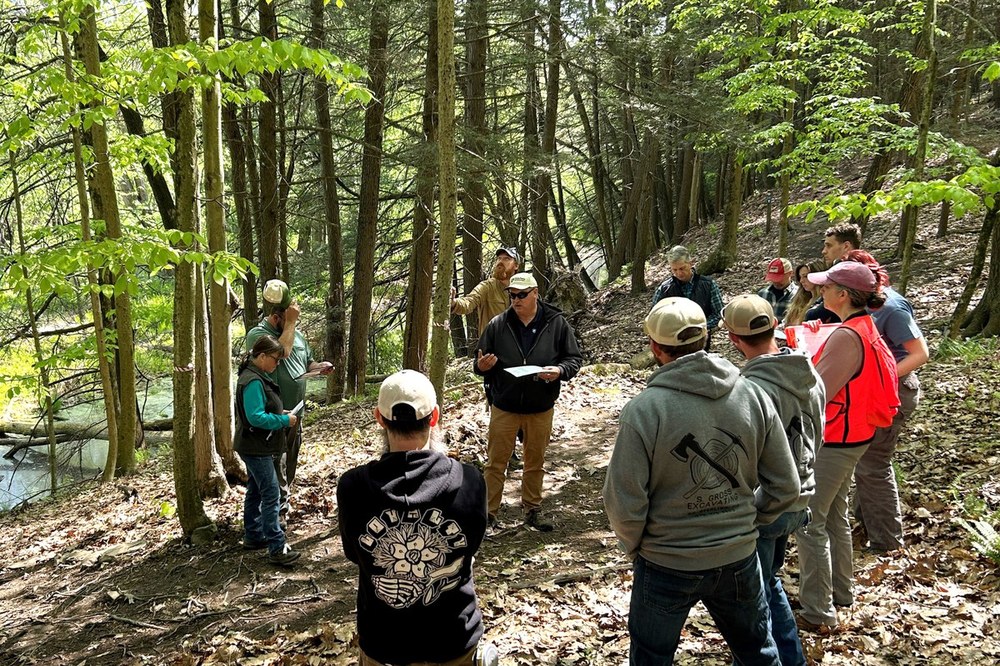Posted: February 17, 2025
The Sustainable Forestry Initiative's trainings for loggers makes an impact on how woods are safely harvested.

SFI's logger training program ensures trainees understand and implement Best Management Practices correctly. Photo by Chuck Coup.
Best Management Practices (BMPs) are a set of guidelines and strategies used in forestry operations to minimize the environmental impacts of timber harvesting, particularly on water quality. These practices are designed to prevent soil erosion (i.e., the process of soil being dislodged and transported across the landscape by wind, water, or ice) and sedimentation (i.e., the process of eroded soil accumulating or being deposited in a new location, such as in wetlands, streams, or rivers). In Pennsylvania, where forests cover a significant portion of the landscape (16.62 million acres) and supply a $21.8 billion dollar forest products industry, timber harvesting requires careful management to ensure that forest ecosystems, including their water resources, are safeguarded for people and all other manner of life in Pennsylvania today and for generations yet to come.
BMPs in forestry focus on a range of practices to minimize soil disturbance and control erosion during timber harvesting. These practices address aspects such as road construction, skid trail design, equipment operation, and the proper handling of materials like fuels and chemicals. For example, maintaining buffer zones along streams and stabilizing roads and trails can significantly reduce runoff and sedimentation. By following BMPs, forest managers help reduce the risk of water pollution, which is critical for maintaining healthy aquatic ecosystems and ensuring safe drinking water. These practices also contribute to the long-term health of the forest by preserving soil quality and water resources, which are vital to both terrestrial and aquatic species.
In Pennsylvania, timber harvesting is governed by the Department of Environmental Protection (DEP) requirements derived from the Clean Streams Law (PA Act 394 of 1937), and across a significant portion of the state is influenced by the requirements of the Sustainable Forestry Initiative (SFI), a well-respected certification program that promotes sustainable forestry practices. One of the fundamental elements of the SFI program is the education and training of loggers to ensure they understand and implement BMPs correctly. This logger training is provided by the Pennsylvania Sustainable Forestry Initiative Implementation Committee (PA SIC), which is composed of forestry professionals, state agencies, and other stakeholders. The committee organizes educational programs and workshops for logging professionals across the state, ensuring that loggers are well-equipped to apply BMPs during timber harvesting operations.
In 2024, the PA SIC received support from the Pennsylvania State Conservation Commission to begin expanding its training outreach to other resource professionals, such as conservation district technicians, consulting foresters, public agency employees, and non-profit organizations. This financial support is derived from the Agriculture Conservation Assistance Program (ACAP). ACAP provides financial and technical assistance for the implementation of BMPs on agricultural operations within the Commonwealth.
The BMP training offered by the PA SIC covers a variety of essential topics, including streamside management, erosion control practices, and road and skid trail layout techniques that minimize environmental damage. Participants are also taught how to identify and address potential environmental risks before they become problems, which helps ensure that timber harvesting operations meet or exceed environmental standards. This approach allows loggers and forestry practitioners to apply BMPs in a way that minimizes their impact on water quality and the broader forest ecosystem.
The importance of this training goes beyond classroom theory—by ensuring that the timber harvesting community is properly educated, the PA SIC helps ensure that BMPs are consistently applied in the field. Well-trained loggers and forestry practitioners are more likely to follow these best practices, which ultimately leads to more sustainable forestry operations and healthier water systems. Certification through the SFI program is a key requirement for those involved in timber harvesting in Pennsylvania, as it serves as a mark of professionalism and ensures adherence to sustainable practices. This critical link between BMP education and BMP implementation driven by SFI training requirements has been recognized by the National Association of State Foresters, the United States Environmental Protection Agency, and the Pennsylvania Department of Environmental Protection.
Best Management Practices will continue to play a crucial role in protecting water quality and minimizing the environmental impacts of timber harvesting in Pennsylvania. Logger training, provided by the Pennsylvania Sustainable Forestry Initiative Implementation Committee, will remain a vital means of ensuring that these practices are effectively implemented. By equipping loggers and forestry practitioners with the knowledge and skills to implement BMPs, Pennsylvania will continue to support sustainable timber harvesting that supplies the wood products we need while safeguarding both the forest and the water resources we all rely on.
For more information about the PA SFI® Implementation Committee, visit their website at sfiofpa.org or call 888-734-9366.
By Chuck Coup, PA SFI Implementation Committee Program Manager
James C. Finley Center for Private Forests
Address
416 Forest Resources BuildingUniversity Park, PA 16802
- Email PrivateForests@psu.edu
- Office 814-863-0401
- Fax 814-865-6275
James C. Finley Center for Private Forests
Address
416 Forest Resources BuildingUniversity Park, PA 16802
- Email PrivateForests@psu.edu
- Office 814-863-0401
- Fax 814-865-6275

